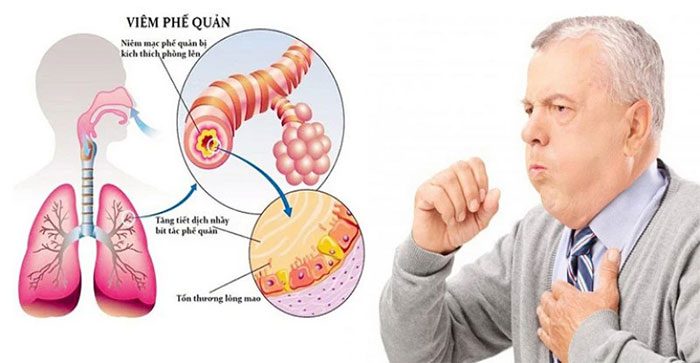Low temperatures, dry air, and the cold during the intensified cold snap can irritate the respiratory system and lungs, leading to symptoms such as wheezing, coughing, and shortness of breath…
Measures to Reduce Shortness of Breath in Winter
1. Why Does Cold Air Cause Shortness of Breath?
In winter, as temperatures drop, the air often becomes drier due to a lack of humidity, which can cause irritation and constriction of the airways (also known as bronchospasm), leading to shortness of breath.
Dr. Craig Jones, an otolaryngology specialist at Harvard University (USA), states that cold air can also disrupt the layer of moisture lining the lower respiratory tract, causing mucus and the protective membrane of the throat to become sticky and thicker than normal, which can block the airways and increase the risk of infections or colds.
Moreover, throughout winter, households tend to keep doors closed to prevent cold winds or use heaters, which means stepping outside can lead to sudden exposure to cold and dry air. This sudden temperature fluctuation can also cause spasms and irritation in the lungs, hindering normal breathing.
Especially for those with asthma, chronic obstructive pulmonary disease, acute bronchitis, or emphysema, special caution is necessary. This is because winter is a time when infections caused by microorganisms (such as viruses, bacteria, fungi, and certain illnesses) like colds and influenza increase. These infections can irritate and inflame the lungs, exacerbating shortness of breath.
In addition to the cold, dry air typical of winter causing breathing difficulties and respiratory issues, several factors may worsen the condition, such as air pollution, dust, and seasonal allergies…
2. Common Respiratory Issues Causing Shortness of Breath in Winter
2.1 Asthma
Cold air is a common trigger for asthma or can exacerbate existing asthma conditions. Furthermore, flu, colds, and other infections tend to increase during winter, worsening asthma symptoms. The onset of asthma is characterized by coughing and episodic shortness of breath…
2.2 Bronchitis
Both chronic and acute bronchitis can present symptoms similar to a cold but are more severe. Common signs include chest tightness, productive cough with mucus, wheezing, and shortness of breath.

Bronchitis can cause shortness of breath in cold weather.
2.3 Pneumonia
Although pneumonia is caused by viral or bacterial infections, cold weather can be a contributing factor that makes the condition worse. Cold air can exacerbate coughing or respiratory infections such as pneumonia, leading to symptoms like rapid, shallow breathing, and fever.
2.4 Chronic Obstructive Pulmonary Disease (COPD)
During winter, patients with COPD are more prone to illness. Strong winds and low temperatures adversely affect the lungs as exposure to cold air can constrict the airways and trigger flare-ups that may increase mucus production, cause shortness of breath, and lead to coughing. These flare-ups not only cause discomfort but can also be life-threatening.
3. How to Alleviate Shortness of Breath Due to Lung Conditions in Winter
Due to the tendency for respiratory illnesses to flare up and poor air quality in winter, here are some measures you should take to keep your lungs healthy:
3.1 Use a Scarf to Cover Your Nose and Mouth When Going Outside
Dress warmly, especially when outdoors in cold weather, and use a scarf to cover your nose and mouth to prevent cold air from entering your lungs.

Dressing warmly is a simple way to reduce shortness of breath from the cold.
3.2 Maintain Hygiene
Dust and mold tend to circulate more in the air during winter, so it’s essential to keep your surroundings clean and wash your hands frequently before touching your nose or mouth to avoid the risk of infection.
3.3 Avoid Strenuous Outdoor Activities
Strenuous physical activities like running can leave you exhausted and panting, leading to respiratory problems. Instead, try gentle exercises at home. Breathing exercises are especially beneficial for improving lung capacity.
3.4 Eat Healthily and Stay Hydrated
A healthy diet and staying hydrated can be good for your lungs. Additionally, carrots and red bell peppers are known to improve asthma symptoms and effectively boost overall lung health, helping to reduce shortness of breath.
3.5 Use Medication
Individuals with respiratory conditions should continue taking prescribed medications and always keep inhalers available during winter, especially those with asthma, to prevent the onset of shortness of breath.


















































